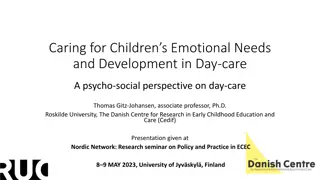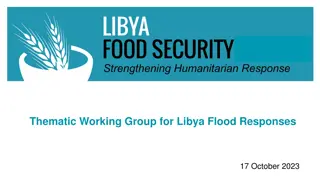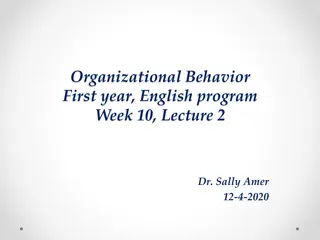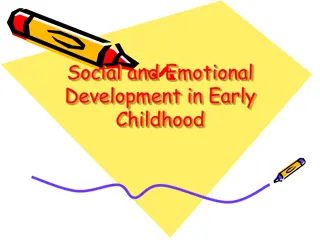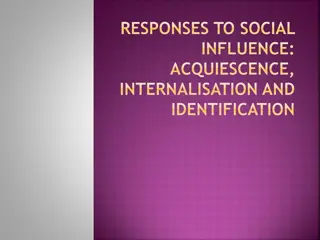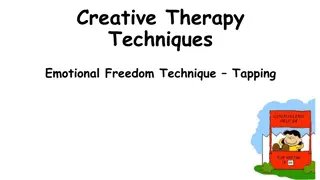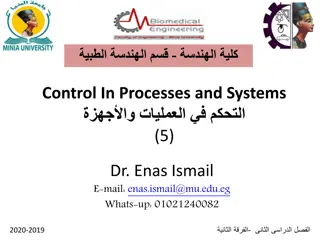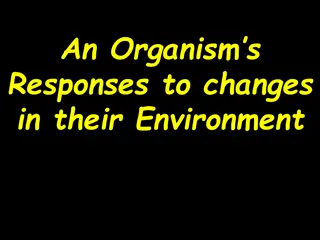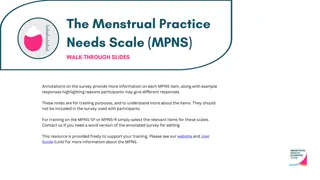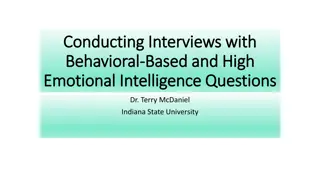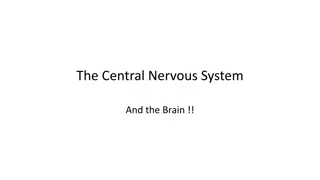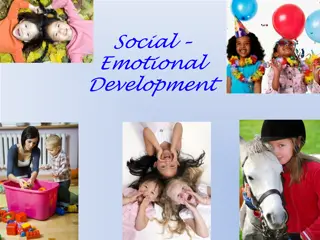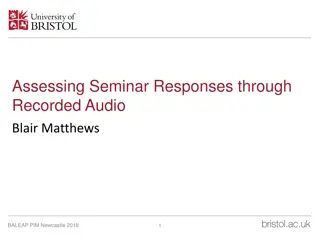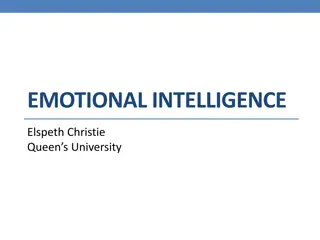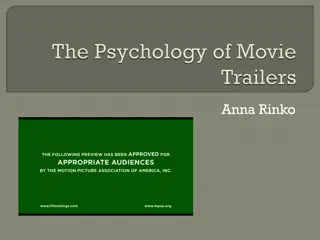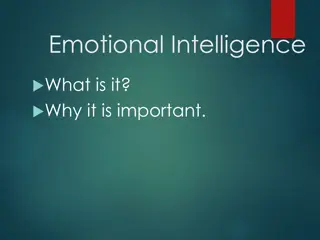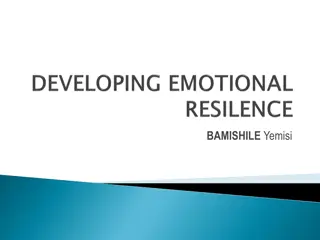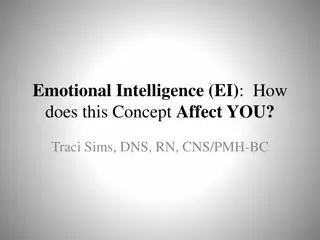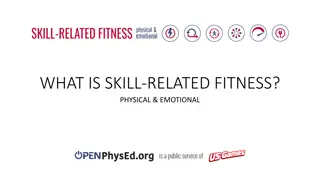Breathe 1-Month Survey 2021-2023 Head Start Responses Analysis
This report analyzes responses from the Breathe 1-Month Survey 2021-2023 in the Head Start program. It covers the roles of participants, frequency of material usage, usefulness of materials in tobacco education, and future likelihood of material use. Insights into the engagement and perceptions of t
0 views • 5 slides
Understanding Emotional Patterns in Families
Families play a crucial role in shaping individuals' emotional responses and behaviors. Caregivers influence how we perceive and manage emotions, impacting our emotional well-being. By examining how different emotions are accepted, rejected, and modeled within families, one can gain insights into th
10 views • 14 slides
Understanding Children's Emotional Development in Daycare from a Psycho-Social Perspective
Scientific evidence emphasizes the early onset of emotional development and its profound impact on lifelong outcomes. The quality of childcare processes plays a pivotal role in shaping children's social-emotional development, highlighting the importance of nurturing emotional relationships in daycar
0 views • 10 slides
Thematic Working Group for Libya Flood Responses - Updates and Coordination Efforts
Thematic Working Group for Libya Flood Responses held a meeting on 17 October 2023 to discuss coordinated responses, targeting needs and damage assessments. Updates and documents published by partners after 10 October 2023 were shared, including reports from SRSG Abdoulaye Bathily and various agenci
0 views • 10 slides
Understanding Emotional Labor in Organizational Behavior
Emotional labor involves employees expressing organizationally desired emotions during work interactions, impacting job performance. Employees may face emotional dissonance when projecting one emotion while feeling another, leading to surface or deep acting. Affective Events Theory (AET) suggests th
0 views • 19 slides
Understanding Emotional Wellness for Inner Well-Being
Exploring the importance of emotional wellness in cultivating inner well-being, this content delves into the facets of social, mental, and emotional well-being. It emphasizes the significance of acknowledging and accepting our feelings, maintaining a positive outlook, and finding purpose and peace w
1 views • 27 slides
Early Childhood Social and Emotional Development Insights
Social and emotional development in early childhood is influenced by various factors such as family dynamics, parenting styles, peer interactions, and cultural backgrounds. Erikson's stages highlight the importance of initiatives and self-understanding in shaping emotional growth. Parents play a cru
2 views • 35 slides
Understanding Emotional Intelligence in the Workplace
Explore the significance of emotional intelligence in the workplace, its definition, five competencies, case studies, and strategies to enhance skills. Dive into scenarios, role-plays, misconceptions, and why emotional intelligence is crucial for professional success. Learn about managing emotions,
0 views • 33 slides
Discovery Motions in Civil Pretrial Practice
In civil pretrial practice, discovery motions play a crucial role when the opposing party fails to respond adequately to formal discovery requests. These motions include Motion to Compel, Motion to Compel Further, and Motion to Deem Facts Admitted. By filing these motions, parties can seek court ord
0 views • 17 slides
Understanding Emotional Intelligence: Key Principles and Skills
Emotional intelligence, as presented by David Taylor, is crucial in perceiving, understanding, and managing emotions in oneself and others. It plays a vital role in professional and personal relationships by enhancing emotional awareness, recognition, and management. The principles of emotional inte
1 views • 22 slides
Understanding Responses to Social Influence in Psychological Context
Social influence plays a significant role in shaping human behavior, with responses such as acquiescence, internalization, and identification affecting individual conformity to group norms. Conformity reflects matching attitudes, beliefs, and behaviors to group standards, which may lead to groupthin
0 views • 16 slides
Understanding Punishment in Operant Behavior
Aversive stimuli can influence operant behavior through noncontingent punishment, as seen in conditioned emotional responses like conditioned suppression. The threat of upcoming aversive events can reduce responding, highlighting the importance of conditioned emotional responses. Punishment operates
0 views • 27 slides
Understanding the Impact of Cortisol on Emotional Expression in Young Children Facing Economic Hardship
This study explores how the stress hormone cortisol is related to emotional expression in young children experiencing economic hardship. Cortisol levels can indicate stress, but prolonged exposure to stress can lead to desensitization. The research focuses on children attending Head Start preschools
0 views • 15 slides
Understanding Emotional Abuse: Signs, Effects, and How to Respond
Explore the intricacies of emotional abuse through the eyes of Dr. Katia Reinert, Associate Director of GCHM. Delve into the techniques used by emotional abusers, self-assessment for identifying abuse, effects of abuse, and guidance on how the Christian community can help. Discover the challenges of
1 views • 31 slides
Understanding Emotional Freedom Technique (EFT) Tapping for Emotional Wellness
Emotional Freedom Technique (EFT) tapping, rooted in acupressure, offers a holistic approach to addressing stress, fear, and phobias. This body-centered therapy draws on ancient Chinese practices, stimulating specific acupoints to improve energy flow. Studies show effectiveness in treating depressio
0 views • 4 slides
Understanding Time Domain Dynamic Responses in Control Systems
In the field of control systems, analyzing time domain dynamic responses is essential for evaluating system performance. This involves studying transient and steady-state responses, as well as characteristics such as steady-state error. By examining these responses to standard input signals, insight
4 views • 30 slides
Understanding Chemistry through Open-Ended Questions
The content provides a detailed assessment of student responses to open-ended chemistry questions related to hydrogen peroxide and its applications in teeth whitening gels. Various student answers are analyzed based on their understanding of the chemistry concepts involved, with explanations given f
1 views • 18 slides
Organisms' Responses to Environmental Changes
Organisms demonstrate responses to changes in their environment through stimuli and reactions. These responses can be internal or external, leading to behaviors such as seeking food, avoiding danger, or adjusting growth patterns. Examples include animals seeking food when hungry or plants growing to
3 views • 15 slides
Enhancing Understanding of MPNS Items Through Annotations and Example Responses
Gain deeper insights into each MPNS item through detailed annotations and example responses, shedding light on potential reasons for varied participant responses. These resources are ideal for training purposes to improve comprehension of the MPNS-SF and MPNS-R scales. Contact us for editable versio
0 views • 37 slides
Enhancing Emotional Intelligence Through Behavioral Interview Questions
Explore the key aspects of emotional intelligence, including social-emotional competencies and cognitive, affective, and behavioral competencies. Learn how to conduct interviews focused on emotional intelligence and discover the importance of relationships, self-awareness, responsible decision-makin
0 views • 44 slides
Understanding the Central Nervous System and Brain
The central nervous system plays a crucial role in enabling organisms to respond to stimuli and adapt to changes in the environment. Comprising receptors, neurones, and effectors, this system facilitates the detection of stimuli, transmission of messages, and appropriate responses. Neurones, includi
0 views • 18 slides
Understanding Social and Emotional Development in Young Children
Explore the general emotional patterns and specific emotions in young children aged 4 to 6 years. Understand the positive and negative characteristics such as self-centeredness, independence, anxiety, and fear, and learn how to deal with common fears like imaginary dangers and separation anxiety. Re
1 views • 19 slides
Safeguarding Infants from Emotional Maltreatment: What Works?
Safeguarding infants from emotional maltreatment is crucial during the first two years of life. Emotional abuse, though not always accompanied by physical or sexual abuse, can have severe impacts on a child's development. The paper explores the structure, prevalence, and impact of emotional abuse on
3 views • 59 slides
Seminar Responses Assessment Method Using Recorded Audio
Seminar responses are challenging to assess due to group dynamics. A novel approach involves students watching seminar excerpts and recording responses as if present. The method is practical and aids in assessing language skills effectively. This study delves into the practicability and language ass
0 views • 17 slides
Effect of Efgartigimod on Humoral Vaccine Responses in Patients with Autoimmune Diseases
The study explores the impact of Efgartigimod, a Neonatal Fc Receptor blocker, on humoral vaccine responses in patients with autoimmune diseases. It discusses how immunosuppressive therapies used in autoimmune disorders may affect susceptibility to infections and impair vaccine immunogenicity, highl
0 views • 18 slides
Emergency Medical Services System Collaborative Meeting Highlights
Highlights from the Emergency Medical Services System Collaborative Meeting on April 5, 2018, including introductions, ReddiNet bed availability for MCI response, monthly notices and responses, year-to-date alerts and responses, patient distribution, bed availability reporting for February and March
0 views • 66 slides
Understanding Emotional Intelligence and its Components
Emotional Intelligence is about identifying, understanding, and managing emotions, recognizing your own needs and those of others, and enhancing interpersonal skills. It involves self-perception, self-expression, and affects decision-making and stress management. People with high emotional intellige
0 views • 20 slides
Understanding Adolescent Development and Emotional Intelligence by Finbar Chambers
This collection presents insights on Gardner's Multiple Intelligences, Emotional Intelligence, and the importance of understanding adolescent development. Finbar Chambers explores emotional makeup, behavior management strategies, and the transition to independence during adolescence. Discover the im
0 views • 20 slides
Understanding Emotional Labour in Probation Practice
Explore the concept of emotional labour in probation practice, highlighting the management of emotions, impact on research and practice, links to burnout, and the role of managerialism and rationality. Delve into emotional work, Chamberlayne's 'emotion work', and feeling rules associated with emotio
0 views • 16 slides
Understanding the Impact of Audio-Visual Content on Movie Trailer Viewers
Movie trailers use various techniques such as music, close-ups, and genre cues to evoke emotional responses and engage viewers. These effects, including chills, gender differences, and memory associations, are strategically crafted to drive sales by leveraging natural human tendencies and psychologi
0 views • 20 slides
Importance of Emotional Intelligence in Religious Leadership
Religious leaders benefit greatly from high emotional intelligence, leading to better performance, increased staff retention, and a more positive work environment. Emotional intelligence plays a vital role in pastoral ministry, enhancing emotional care for congregants. Educational programs focusing
0 views • 15 slides
Understanding Emotional Intelligence in the Workplace
Emotional intelligence plays a crucial role in professional success, impacting how we lead teams, handle pressure, and build relationships. This webinar explores the definition of emotional intelligence, its significance in the workplace, and practical ways to enhance it. Discover the key elements o
0 views • 14 slides
Understanding Emotional Intelligence: Definition, Importance, and Examples
Emotional intelligence, a term that originated in the 1960s, refers to the ability to recognize and manage emotions in oneself and others effectively. It involves identifying emotions, understanding their impact, and using this awareness to guide behavior. Emotional intelligence is crucial for perso
0 views • 35 slides
Enhancing Emotional Resilience: Key Strategies and Benefits
Exploring the concept of emotional resilience, this content covers the definition of emotions, emotional resilience, and the domains of resilience. It delves into the importance of emotional resilience, ways to improve it, and how it helps individuals bounce back from adversity, maintain balance, an
0 views • 17 slides
Exploring the Ups and Downs of Emotional Health Throughout the Day
Dive into a visual journey depicting the ebb and flow of emotional well-being in a day, from morning reflections to evening introspections. Experience different facets of emotional health through images, timelines, and audio clips, offering insights to nurture your mental and emotional well-being.
0 views • 7 slides
The Impact of Emotional Intelligence in Nursing Practice
Emotional intelligence plays a crucial role in nursing, influencing personal well-being, patient outcomes, and stress management. Nurses with higher emotional skills are better equipped to navigate the challenges of their profession. Understanding the history and significance of emotional intelligen
0 views • 23 slides
Performance Development: Emotional Factors and Strategies
Understanding emotional factors in performance development, collecting relevant information, utilizing positive self-talk for emotional development, and the importance of monitoring and evaluating performance for continual improvement and targeted training. Visual aids complement the explanation of
0 views • 4 slides
Social-Emotional Health and Resilience of Teachers in East European Countries
This study explores the social-emotional health and resilience of teachers in Latvia, Lithuania, and the Slovak Republic as part of an Erasmus+ project aimed at developing a digital support system to promote their well-being. The interplay between mental health, social-emotional health, and resilien
0 views • 30 slides
Understanding Skill-Related Fitness: Physical and Emotional Aspects
Skill-related fitness encompasses both physical and emotional components, such as agility, balance, coordination, power, reaction time, and speed. Physical agility involves quick body movements, while emotional agility relates to positive responses in various situations. Physical balance requires we
0 views • 7 slides
Gender and Emotional Expression: A New Perspective on Identity and Mental Health
Exploring the societal constructs of gender and their impact on emotional expression, this study delves into the Gender Roles Hypothesis, challenges traditional norms around emotional display, and examines the correlations between gender and mental health outcomes. The research sheds light on the ne
0 views • 15 slides


